Faro, Portugal: Visitor And Retirement Information
Faro, Portugal, is a vibrant city located in the southernmost part of Portugal, the Algarve region.
For instance, when visiting the Algarve region, most people choose to go to Lagos or Portimão. These are places where you can find more of a beach resort lifestyle with lots of things to do, but with tourists.
In short, if you are looking for a slightly different and more traditional experience of Portugal, while still being in the Algarve region next to great beaches, then Faro is the place for you.
Here is everything you need to know about Faro, Portugal…
When visiting or retiring to Portugal, people typically pick Lisbon, Porto, or Madeira. Faro, however, is a charming Moorish-style town with a large airport located in the Algarve region that’s beginning to catch the attention of tourists and potential retirees alike.
Here you’ll find that prices are lower and lifestyle options are vast, making it an attractive destination for anyone looking to upgrade their retirement and lower their monthly budget.
Same goes for travelers. You’ll be able to enjoy sightseeing without going over your budget.
Faro is an ideal place for snowbirds. You can count on 300 days of sunlight a year, making this one of the sunniest places in Europe.
Plan your trip here any time of the year without having to worry about rain or snow.
Cost Of Living In Faro
The cost of living in Portugal is among the lowest in Europe. This is one of the country’s most attractive traits.
Compared to most other European cities, the cost of living in Faro, Portugal, is seen as being quite affordable. Granted, it all depends on your personal tastes, necessities, and lifestyle.
Rent Costs
A couple can live comfortably in Faro, Portugal, with a monthly budget of about US$2,000. You can also live well, as a couple, on around US$1,400 a month, depending on your lifestyle and whether you’re willing to make adjustments here and there.
Rent in Faro, Portugal, ranges from US$600 to US$1,400. A small, one-bedroom apartment in the city center goes for about US$760 a month. A similar apartment outside the city center costs about US$640 a month.
If you’re moving to Faro with children, you’ll need a bigger accommodation. A three-bedroom apartment costs around US$1,544 a month in the city center and rents for about US$1,202 a month outside the center.
As for basic utilities––electricity, heating, cooling, water, and garbage––expect a minimum cost of US$74 per month.
Transportation Costs
The beauty of choosing to visit or retire in Portugal is that you don’t need to own a car. Portugal’s public transportation is clean and dependable.
In Faro, a one-way bus ticket costs less than US$3, and a monthly pass costs US$38. Taxi fares start at US$5.
Faro is an extremely walkable city, and the best way to get to know the area is on foot. This will bring your transportation expenses down to zero.
Retail Shopping In Faro
Whether you’re a shop-a-holic or a minimalist who only shops once in a while, having an idea of retail prices can help you decide whether you’ll be doing your shopping in Faro, or if you’d rather head to a neighboring town or city.
Here’s a sample of retail prices in Faro, Portugal:
- Levi’s jeans, US$88
- Zara summer dress, US$33
- Nike running shoes, US$72
- Men’s leather business shoes, US$108
Groceries
Your grocery bill will vary depending on what you buy. Imported goods cost more than local products. Think about what things you can live without, things you can’t live without, and brands you could swap for local ones.
Depending on the changes you make, your monthly grocery budget could be US$200 to US$400.
Things To Do In Faro
Faro has spectacular places to visit and a bunch of activities to enjoy.
Start by walking around town and getting an idea of your surroundings. This is a great way to get to know a place and not miss anything.
Also, you could unexpectedly find yourself in front of a tiny café, a local restaurant, a small library or bookstore, or little boutique that you would’ve otherwise missed.
Next, make a list of places you’d like to visit and create an itinerary. Two or three places per day is a good starting point because you’ll have lots of time to enjoy each one, but you can visit more or less depending on how long you spend at each site.
Here’s a list of places to consider visiting in Faro:
- Marina de Faro (Faro Marina)
- Igreja de Santa Maria (Santa Maria Church)
- Museu Municipal de Faro (Municipal Museum of Faro)
- Igreja do Carmo (Carmo Church)
- Casa do Arco do Repouso (House of the Gate of Rest)
Marina De Faro
Faro is a coastal city on the southernmost tip of the Algarve. As such, it should come as no surprise that it boasts an impressive marina. It’s close to the commercial part of the city and the historic center.
If you’re up for it, you could take a day trip out to sea. On the northwest end of the marina you’ll find the Maritime Museum. It’s small, but it has information and displays about Portugal’s Age of Discovery.
Igreja De Santa Maria
Igreja de Santa Maria is also known as Sé Catedral de Faro. Faro’s cathedral is one of the most important buildings in the Portuguese city.
This Roman Catholic cathedral is in the city’s historic center. Although it’s been renovated, it still maintains a few architectural elements from when it was originally built. Lovers of history and museums should make sure to stop by and take in this breathtaking cathedral.
Museu Municipal De Faro
The Faro Municipal Museum of Art and Archaeology is in Old Town Faro. The museum was founded in 1973 and houses objects discovered in the city and surrounding areas, such as busts from the Roman period.
It wasn’t originally built as a museum, but rather as a convent in the early 16th century. The nuns left in the 1830s, and it became a museum during the 20th century.
Igreja Do Carmo
Igreja do Carmo (Carmo Church) wasn’t completed until the 19th century due to an earthquake in the mid-1700s.
The church’s main attraction is the Capela dos Ossos (Chapel of Bones) located behind the main building. The walls are covered in the skulls and bones of over 1,000 people, presumably monks. Supposedly, the chapel’s purpose is to remind people how fleeting life is.
Casa Do Arco Do Repouso
Casa do Arco do Repouso (Home of the Arch of Rest) is a historic site near Faro’s center and consists of the remains of ancient fortification walls.
Retire In Faro, Portugal
Faro is the perfect destination for retirees looking for a peaceful and enjoyable retirement. Living in Faro, Portugal, would be living in a welcoming community, with great weather, and with a relaxed pace of life.
Getting to Faro, Portugal, is extremely easy given that the Faro Airport (FAO) is only a 10-minute drive from the city. Public transportation is made accessible and easy to use to get to and from the airport.
On top of that, Faro is only a two and half to three-hour drive from Lisbon, and only an hour from Lagos. If you prefer taking the train, the amount of time it takes to get to Faro is about the same.
You can make the most of your savings since the cost of living in Faro, Portugal, is so cheap. Not only will you be living a life on a budget, but you will be living the life on a budget in Europe.
Another aspect that makes Faro, and more specifically Portugal, attractive to the retiree is that Portugal has a non-habitual residency program that offers tax benefits for retirees.
If you are looking to move or live in Faro, Portugal, then you may want to get a visa or residency in Portugal. The process to do so in Portugal is simple compared to other countries, be sure to look into all your options before choosing the right one for you.
Regardless, figuring out residency and visa options, while important and necessary, is secondary to choosing where you want to live or retire.
Faro, Portugal, with its beautiful surroundings, cultural richness, and excellent healthcare system, is an ideal environment for retirees to enjoy their golden years.
Move To Faro
Getting ready to move isn’t as complicated as it may seem. Take only the essentials and a few things that hold sentimental value and that you can’t live without. Clothes, bags, shoes, books, family pictures, and paintings go on this list.
Sell or donate larger belongings like cars, furniture, kitchenware, dishes, and mattresses to family and friends. You can buy those things in Faro. You might decide to go without a car as Faro is a pedestrian-friendly city and public transportation is reliable and inexpensive.
Visas And Residency
Residency Permits For Non-EU Citizens
Start by applying for a Type 1 Resident Visa. Go to the Portuguese Embassy in your home country to start the process. You should apply for this visa three months prior to your move to Portugal.
Once you have the visa and have traveled to your new home, you have six months to apply for a Resident Permit. Apply for a Schengen Visa first online.
Make several copies of the required documents as you’ll need them for the rest of the application process.
For more information, visit SEF here or the Ministry of Foreign Affairs here.
Is Faro, Portugal, Safe?
Faro, and Portugal, are both considered to be very safe for residents and visitors. Portugal is even considered the sixth safest country in the world, while the United States is ranked as being the 129th safest country in the world.
Taking that into consideration, there should be no safety worries when traveling to or moving to Faro, Portugal.
There should still be common sense when it comes to safety and some precautions that you can take so you can rest easy and get the most out of your trip.
Be sure to keep an eye on your belongings, be weary of pickpockets, and avoid walking in poorly lit areas, or alone at night.
Overall, by using common sense and being aware of your surroundings, you can enjoy a safe stay in Faro, Portugal.
Weather In Faro, Portugal
Faro, Portugal, is blessed with ideal weather. The coolest season is from November to March, but temperatures are rarely lower than 66°F (8°C).
Faro, Portugal, enjoys a Mediterranean climate, which means that you can enjoy mild winters and hot summers.
The city and area enjoy long, sunny days throughout the year, and is perfect for people who enjoy a warmer climate, with the chance of a comfortable chill or a slight cold in fall and winter.
In the summers, temperatures can reach up to 86°F (30°C), while the winters tend to boast a steadier mild average, usually between 41°F and 59°F (5°C to 15 °C).
The skies tend to be clear and blue during the summer in Faro, while it tends to rain during the winter.
While it does not tend to rain much throughout the year, be sure to keep an umbrella handy during the colder months.
Anyone who feels like heading to the beach and taking a swim, should keep in mind that even during the warmer months, such as June, the waters near Faro are still cool at around 71°F (21.5°C).







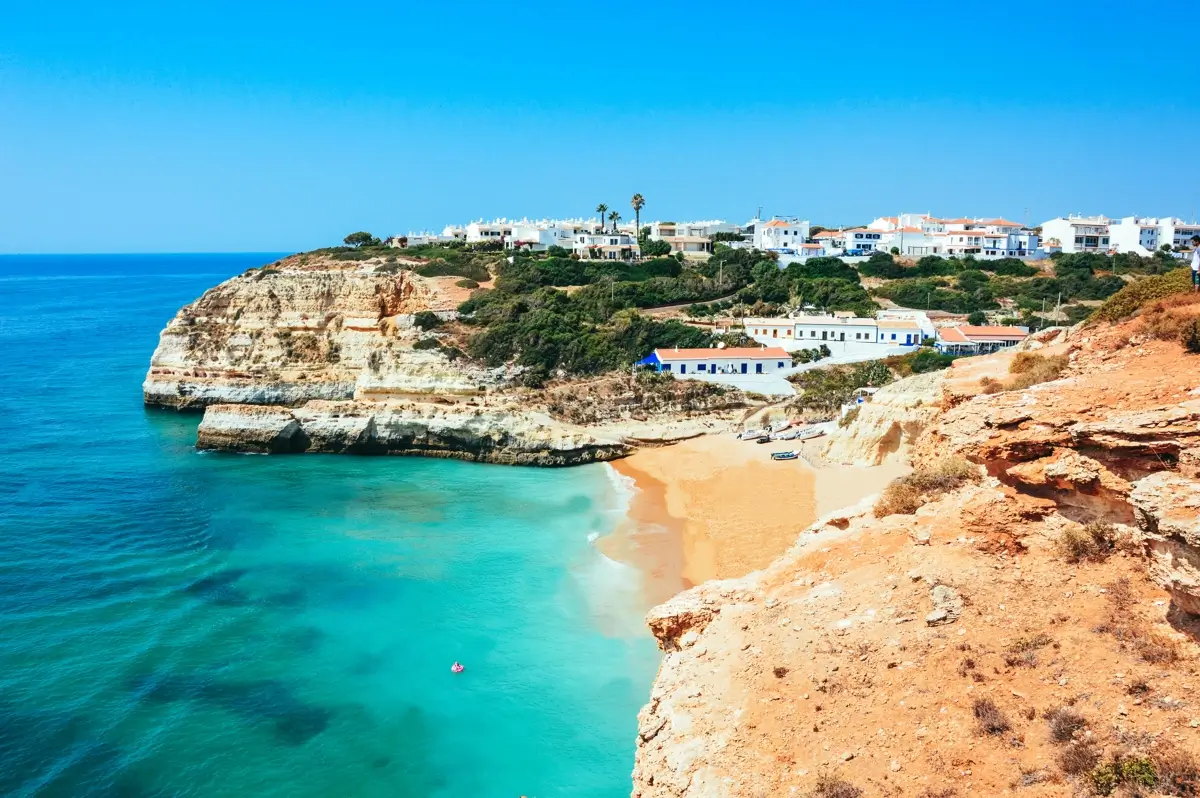





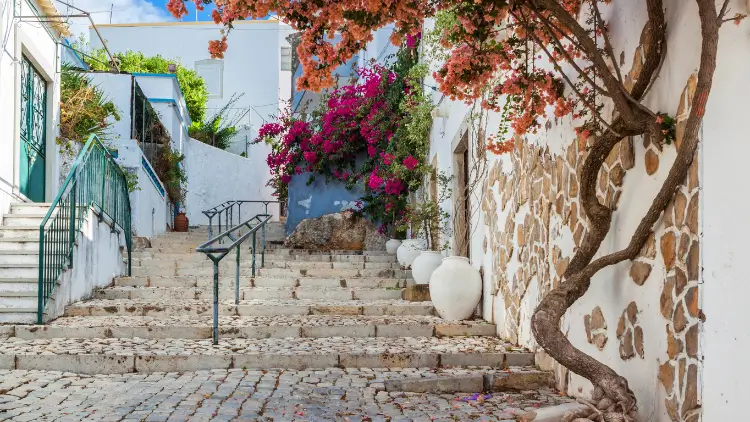
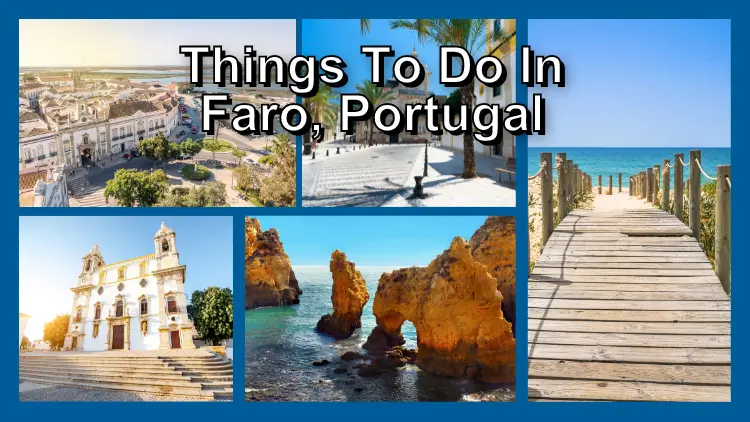
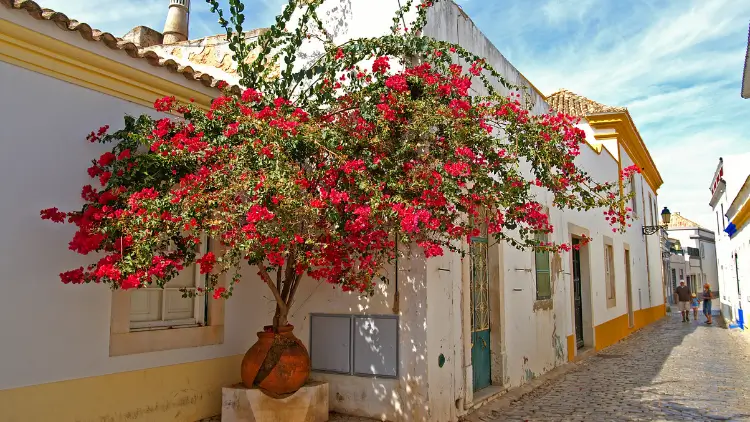
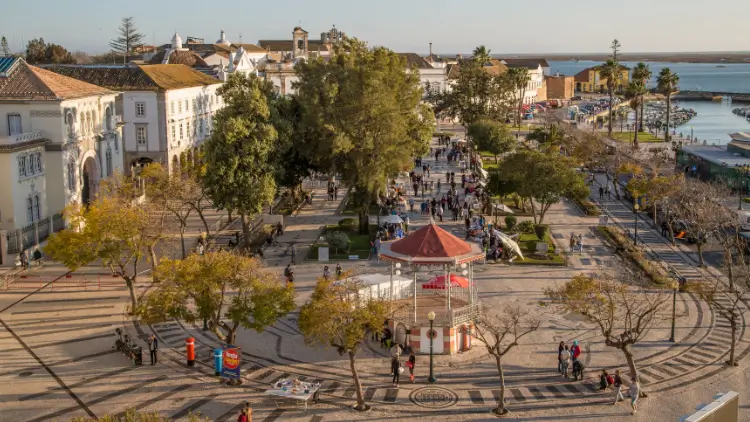


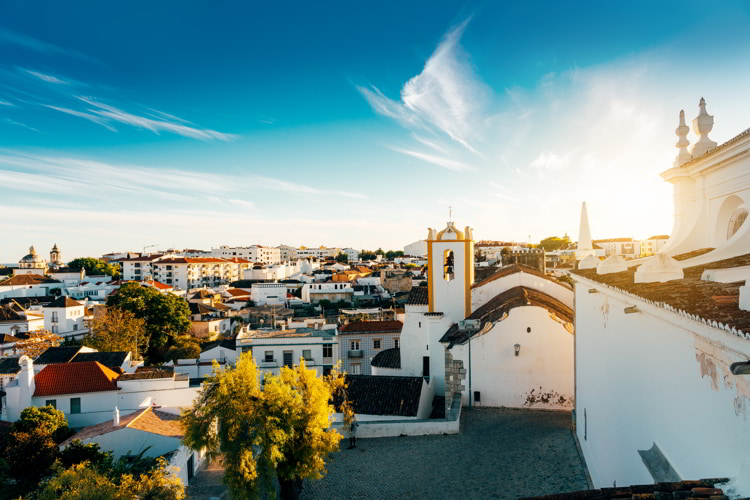 . '
. '
 . '
. '
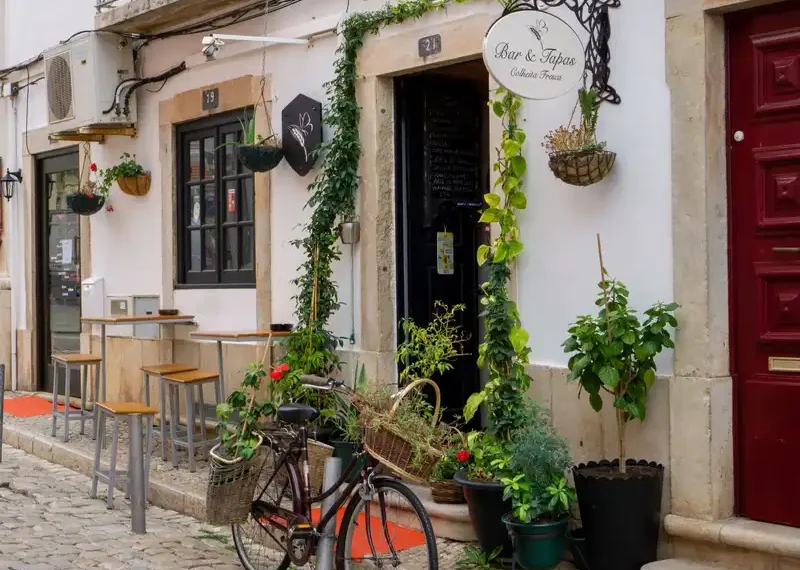 . '
. '
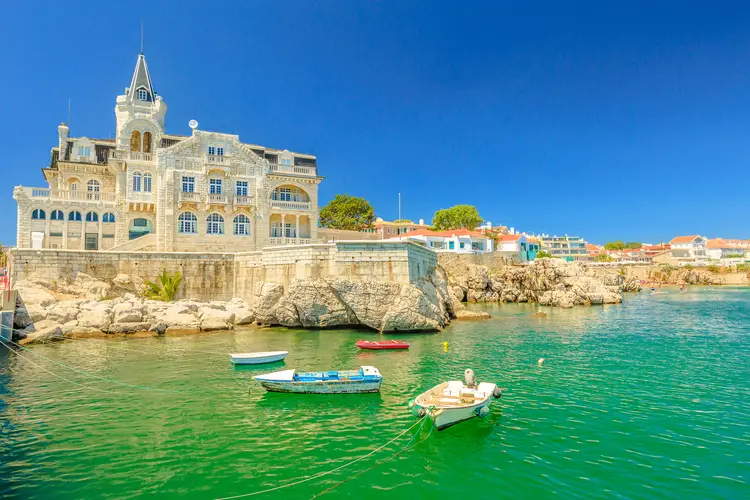 . '
. '
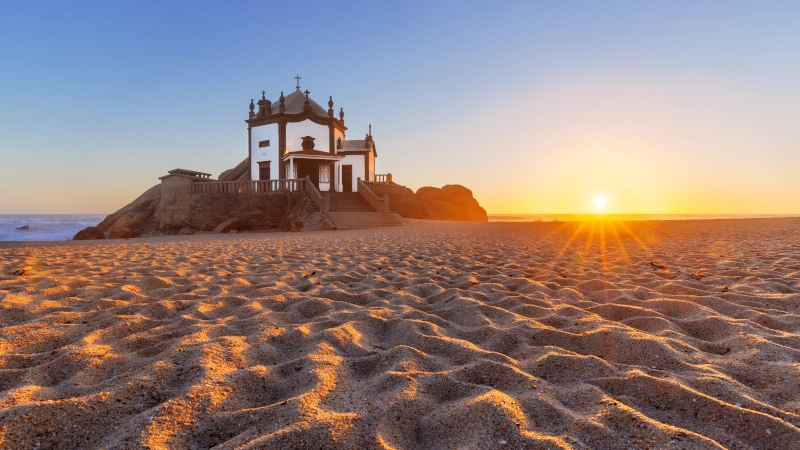 . '
. '








